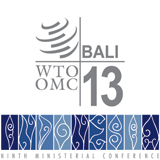9TH WTO MINISTERIAL CONFERENCE, BALI, 2013
Briefing note: Monitoring Mechanism
At the Bali Ministerial Conference, WTO members hope to adopt a Monitoring Mechanism on special and differential treatment (S&D) provisions which give developing countries special rights in multilateral trading rules.
Updated: November 2013
THIS EXPLANATION is designed to help the public understand developments in the WTO. While every effort has been made to ensure the contents are accurate, it does not prejudice member governments’ positions.
> Ministerial Conferences
> Bali Ministerial Conference
> Other briefing notes
S&D provisions give various types of flexibilities to developing and least-developed country (LDC) members of the WTO — ranging from provisions aimed at increasing trade opportunities, safeguarding developing and LDC interests, granting longer transition periods and providing technical assistance. A recent WTO summary identified over 100 such provisions in the WTO's agreements and decisions (see WT/COMTD/W/196).
The Monitoring Mechanism will provide a forum for monitoring S&D issues, with the objective of improving beneficiaries' ability to utilize them. In particular, it will provide for regular reviews of existing S&D provisions in multilateral WTO agreements and the making of recommendations.
Paragraph 44 of the Doha Ministerial Declaration mandated negotiations on S&D, calling on WTO members to review all provisions with a view to strengthening them and making them more precise, effective and operational. WTO members have been working on this mandate since 2001, in the Special Session of the Committee on Trade and Development (CTD) — which is the institutional home for the S&D negotiations.
The proposal to establish a Monitoring Mechanism of S&D provisions was initially submitted by the African Group in 2002. The General Council agreed to establish a mechanism for special and differential treatment in July 2002, and instructed the Special Session of the CTD to elaborate the functions, structure and terms of reference for such a mechanism.
At the Geneva Ministerial Conference in 2011, ministers agreed to expedite work towards finalizing the Monitoring Mechanism. Since 2011, the Chair of the Special Session of the CTD, Ambassador Kwok Fook Seng of Singapore, held consultations in various formats aiming to bridge members' convergence on the concepts and operations of the Monitoring Mechanism.
The draft decision on the Monitoring Mechanism, to be forwarded to ministers for formal adoption at the 2013 Bali Ministerial Conference, indicates that the Mechanism shall act as a focal point within the WTO to analyze and review all aspects of implementation of S&D provisions, and where the review identifies a problem, the Mechanism may make recommendations, including, if necessary, for initiation of negotiations, to the relevant WTO body in charge of the technical substance.
It is also agreed that the recommendations emanating from the Mechanism will inform the work of the relevant body, but not define or limit its final determination.
The Mechanism will meet twice a year in dedicated sessions of the CTD, with the possibility of additional meetings as appropriate. The status of recommendations emerging from the Mechanism shall be included in the annual report of the CTD to the General Council, the WTO’s highest-level decision-making body in Geneva. The Mechanism shall be reviewed three years after its first formal meeting.
Once adopted, the Mechanism will mark an important step in the multilateral trading system's responsiveness to the concerns of developing countries
